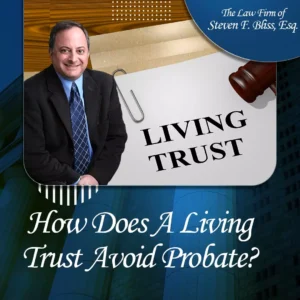How to save your family time, money, and hassle while avoiding the probate process.
How does a living trust avoid probate?
Listen to this Article on:
Living Trusts & Avoiding Probate in California.
Probate court proceedings (during which a deceased person’s assets are transferred to the people who inherit them) can be long, costly, and confusing. Consequently, people take steps to spare their families the hassle. Different states, however, offer different ways to avoid probate.

Probate is complicated, time-consuming, and stressful. Family, friends, the government, and creditors can raise objections, ask for more than their fair share, cause confusion, and delay the process. Below, you will find essential information to help you understand what probate is and how to avoid it.
Here are your Probate Avoiding options in California.
Living Trusts
In California, you can make a living trust to avoid probate for virtually any asset you own—real estate, bank accounts, vehicles, and other assets. You need to create a trust document (similar to a will), naming someone to take over as trustee after your death (called a successor trustee). Then—and this is crucial—you must transfer ownership of your property to yourself as the trustee of the trust. Once all that’s done, the terms of the trust will control the property. At your death, your successor trustee will be able to transfer it to the trust beneficiaries without probate court proceedings.
Joint Ownership
If you own property jointly with someone else, including the “right of survivorship,” then the surviving owner automatically owns the property when the other owner dies. No probate will be necessary to transfer the property, although it will take some paperwork to show that title to the property is held solely by the surviving owner.
Please Help Us Spread The Word By Giving Us a 5 Star Rating on This Article
Free Initial Consultation with
Steven F. Bliss Esq.

★ ★ ★ ★ ★

In California, these forms of joint ownership are available:
Joint tenancy. Property owned in joint tenancy automatically passes to the surviving owners when one owner dies. No probate is necessary. Joint tenancy often works well when couples (married or not) acquire real estate, vehicles, bank accounts, or other valuable property together. Each owner, called a joint tenant, must own an equal share in California.
Community property with right of survivorship.
California is a community property state, which means that spouses and registered domestic partners generally own all property acquired during the marriage jointly unless they take steps to keep it separate. If spouses or partners hold title to an asset as community property with the right of survivorship, it automatically passes to the survivor when one spouse or partner dies.
Payable-on-Death Designations for Bank Accounts
In California, you can add a “payable-on-death” (POD) designation to bank accounts such as savings accounts or certificates of deposit. You still control all the money in the account — your POD beneficiary has no rights to it, and you can spend it all if you want. The beneficiary can claim the money directly from the bank at your death without probate court proceedings.
Transfer-on-Death Registration for Securities
California lets you register stocks and bonds in a transfer-on-death (TOD) form. People commonly hold brokerage accounts this way. If you register an account in TOD (also called beneficiary) form, the beneficiary you name will inherit the account automatically at your death. No probate court proceedings will be necessary; the beneficiary will deal directly with the brokerage company to transfer the account.
Transfer-on-Death Deeds for Real Estate
California allows you to leave real estate with transfer-on-death deeds. These deeds are sometimes called beneficiary deeds. You sign and record the deed now, but it doesn’t take effect until your death. You can revoke the deed or sell the property; the beneficiary you name on the deed has no rights until your demise. Cal. Probate Code § 5620.
Transfer-on-Death Registration for Vehicles
California allows transfer-on-death registration of vehicles. If you register your vehicle this way, the beneficiary’s name will automatically inherit the vehicle after your death. No probate court proceeding will be necessary.
Simplified Probate Procedures
Even if you don’t plan to avoid probate, your estate may qualify for California’s simplified “small estate” probate procedures.
